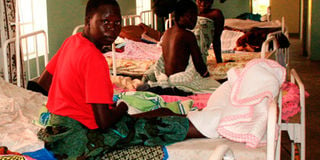Midwives in Arua use phone lights to deliver mothers

Alarm. Pregnant mothers at Arua Regional Referral Hospital. Meanwhile at Omugo Health Centre IV, mothers are being delivered using torches since the hospital lacks a reliable power supply. PHOTO BY CLEMENT ALUMA
ARUA.
Pregnant mothers at Omugo Health Centre IV in Terego County, Arua District, would have suspended giving birth at night if it was within their powers.
This is partly because Omugo Health Centre lacks reliable power supply since the solar batteries for the solar power system got broken about five years ago.
A nurse on duty who asked not to be named because she is not authorised to speak to journalists, said they had got used to the situation ever since the generator and the solar systems broke down.
“If it was within our powers, we would have told these mothers not to give birth at night but you never tell when the labour pains begin; it is God’s plan.
Sometimes the batteries of these phones go down and you have no way of charging it, the government should really come to our aid,” she said recently.
But the officer in charge of the health centre, Dr Geoffrey Tabu, said plans are under way to fix the problems the centre is currently facing.
“Infectious Disease Institute (IDI) has been making some assessments with the view of fixing the broken systems at the facility and we hope that they will come and help us,” Dr Tabu said.
In the wards, the midwives and pregnant mothers currently use the local paraffin lamps (tadoba) which emit dangerous smoke.
Besides, there is a danger of the tadobas catching fire, especially when not carefully used.
The new generator at the health centre, which worked for some months, only lacks a battery. The health centre serves a catchment population of about 300,000 people from the vast Terego County and neighbouring Maracha and Yumbe districts.
The health facility receives Shs4m as quarterly releases from the government but Dr Tabu said the money was not enough since most of it goes into services.
Last year, Ms Olive Ederu, an executive member of West Nile Legal Institute for Community Empowerment, which carried out a research into the affairs of the health facility, discovered that the centre was among the places in the region with high infant deaths due to anaemia.




